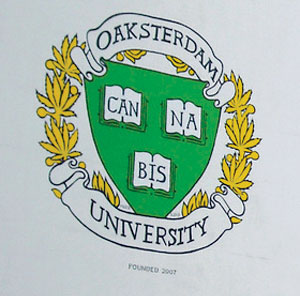Al Capone, the most notorious gangster in the history of this country, didn’t go to prison for murder, assault or any of the other violent crimes that solidified his reputation. Capone went down on tax evasion and prohibition charges.
It seems this is the same manner in which the federal government intends to crack down on California’s law-abiding medical cannabis operators—one 1040 at a time.
Richard Lee became a medical marijuana pioneer in 2007, when he started Oaksterdam University in Oakland. The cannabis trade school went on to spawn a legion of new growers and cannabis club operators, make Lee a millionaire and promote greater awareness and acceptance of marijuana. Confined to a wheelchair yet able to run circles around cannabis opponents during debates, Lee became the face of the legalization movement with Prop. 19.
But last week, the Drug Enforcement Agency and IRS agents raided Lee’s home, school and other medical marijuana-related businesses. Meanwhile, no handcuffs were put on Lee or anyone else, sparking speculation throughout the cannabis community that industry leaders are being systematically targeted.
“He was the face of the movement, or at least he was for a while with Prop 19,’ says an employee at Fortune Wellness Center in San Jose who asked not to be named.
Several raids took place at the end of last year in Oakland and Southern California, after U.S. Attorneys sent out letters stating that all dispensaries were operating outside of the law and would be targeted. The frequency of raids and seizures faded in recent months, but it seems that may have just been the calm before the storm. Lee says that last week’s raids bankrupted him and his businesses, and the IRS’s role will only grow more prominent in future pot club busts.
“It says something when they raid a school and dispensary, raid his house and another facility, and yet they don’t even arrest him,’ says Doug Chloupek, operator of MedMar Healing Center in San Jose. “There has to be some accountability on the government’s side. They’re imposing tax laws that were created for drug cartels not to take tax subsidies on cocaine trafficking.’
Jagger, a budtender at Emerald Crossings Health Center, says that “a lot of people are talking about how the IRS was there. It’s the Al Capone reference—they can bring anyone down.’
The tax code used to target collectives by the IRS is 280E, which went into effect in 1982—the same year President Ronald Reagan started the “War on Drugs.’ 280E prohibits any tax deductions related to “trafficking in controlled substances’—rent, utilities, wages, etc.—which puts collectives in the IRS’s crosshairs because it is still classified as a Schedule I drug, similar to cocaine and heroin. “It’s the exact same thing to them,’ Chloupek says, “and that’s the true root of the problem.’
Notable for its ability to back-tax collectives out of business, 280E has proven vulnerable to legal appeals. Harborside Collective in Oakland, is currently dealing with the IRS over the tax code.
All of this could be just election year posturing. But if it’s for real, taking down industry leaders is similar to an old boxing strategy: Kill the head and the body will follow.




